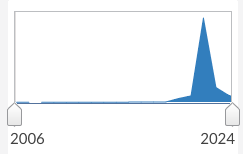
March 22, 2024, by Brigitte Nerlich
Vaccine hesitancy in Europe: A conceptual exploration
Many things changed rather fast when the Covid-19 pandemic spread around the world at the beginning of 2020.
There were new social phenomena, like ‘social distancing’, a so-called non-pharmaceutical intervention intended to stop the spread of the coronavirus. There were new scientific and bodily phenomena, like quickly developed vaccines, so-called pharmaceutical interventions intended to stop the spread of the virus; and much more.
Languages all over the world changed rapidly in response to all these new interventions and developments.
I have written a bit about pandemic language change and a bit about social distancing but nothing much about vaccines. My colleague, Professor Pru Hobson-West and a team of scholars across Europe have done just that in a Horizon project Addressing Vaccine Hesitancy in Europe (VAX-TRUST). The team were especially interested in the issue of ‘vaccine hesitancy’ before and after the beginning of the pandemic.
They have just published a paper exploring the semantic fields in which the word ‘vaccine’ was embedded in different European languages just before the beginning of the pandemic and just after.
I found one result especially interesting, namely that the pandemic opened up the black box of vaccine production for many people. Before the pandemic, a vaccine was mostly something one just ‘got’ or one didn’t get for various reasons, but people rarely thought about where ‘it’ came from, how it was made and by whom – thoughts that might contribute to ‘vaccine hesitancy’.
But this is not the issue I am writing about. After reading the paper, I began to muse about the phrase ‘vaccine hesitancy’. I wondered whether that phrase was also part of the rapid behaviour and language change at the time. Was it used more during the pandemic than before and after? And what are the equivalents of that phrase in other European languages?
I’ll first define vaccine hesitancy, then look at its frequency of use over time in English news, then look at words for that phenomenon in other European languages.
Vaccine hesitancy
The Oxford English Dictionary defines vaccine hesitancy as “Hesitancy, reluctance, or refusal to have oneself or one’s children vaccinated against an infectious disease or diseases”. The SAGE Working Group on Vaccine Hesitancy defines it as a “delay in acceptance or refusal of vaccination despite availability of vaccination services”. According to the OED, the phrase was first used in 2006: “The conference continues tomorrow with a focus on vaccine hesitancy and parents who refuse to vaccinate their children.” (PR Newswire (Nexis) 15 July)
The phrase thus existed in English well before the pandemic, at least in academic English. It is, or has become, as Peretti-Watel et al. (2015) have shown, a rather ambiguous notion covering various aspects of belief, attitude or behaviour, aspects of vaccine hesitancy that are also explored in more depth in Maya Goldenberg’s book on Vaccine Hesitancy, written in 2021, during the pandemic.
As we shall see, the concept also varies a bit from language to language and the prominence it had in language use changed over time.
Vaccine hesitancy in the news
My next question was: Did the use of the phrase ‘vaccine hesitancy’ increase during the pandemic? To find out, I went to the news data base Nexis and searched for “vaccine hesitancy” (on 9 March) in all English language news. The timeline shows a definite peak during the pandemic. That is to say, at least in the news, it was used much more frequently than before, which must have contributed to raising awareness about the issue, for good or for ill, I suppose.
I can’t check news databases in other languages to see whether there were similar peaks in usage. If somebody can, please have a look for me and let me know. But the question for me would be: What search terms would one use? That brings me to the next part of my musings.
What’s the word?
I was travelling on the Eurostar through Belgium and Germany and began to wonder how I would talk about vaccine hesitancy in French and German, for example. My little brain could not find any equivalent phrases, only paraphrases (as in ‘people who hesitate about getting a vaccine’).
In German one would really not say “Impfzögerlichkeit” for example. Some people might talk about “Impfskepsis”, but is that the same as vaccine hesitancy? When I asked on social media what people would say, the first answer I got was a parody – but one that’s indicative of my problem regarding a search term: “Nichteinnahmeeinerimpfungdieausideologischengründenangebotenwurde” (Not taking a vaccination that was offered for ideological reasons)
Others made more serious suggestions such as “Impfverweigerung” – vaccine rejection – or “Impfgegnerschaft” – vaccine opposition. But these words smack of vaccine denial to me. A more serious contender is perhaps “Impfmüdigkeit” – vaccine fatigue, which, apparently, was used even before the pandemic… My feeling is that vaccine fatigue is different from vaccine hesitancy, but I might be wrong.
In the media, some newspapers would probably just use ‘vaccine hesitancy’, especially when talking about the USA, as in this example: “Das Problem, das die USA seit zwei, drei Wochen haben, ist mit dem Begriff ‘vaccine hesitancy’ kurz und prägnant beschrieben. Viele zögern, bevor sie sich impfen lassen – oder auch nicht.” (Wormser Zeitung, 4 May 2021) (The problem that the USA has had for two or three weeks is briefly and succinctly described with the term ‘vaccine hesitancy’. Many people hesitate before getting vaccinated – or not.)
What about French? Here too I could not come up with anything, but at last I found a phrase, ‘hésitation vaccinale’, which seems to have been in use in official papers since before the pandemic, and which maps quite neatly onto vaccine hesitancy.
France is famous for quite a bit of “hésitation vaccinale”, as this article indicates, entitled “Vaccination: Une hésitation française”. Interestingly, “hésitation vaccinale” got a book-length definition at the beginning of 2020, indicating a surge in pandemic popularity perhaps. There is also ”l’hésitation face à la vaccination” and “défiance vaccinale” – vaccine distrust (not defiance – this is a nice case of so-called ‘false friends’).
But the English phrase was also used in French, just as in German reporting. For example, in an article entitled “Vaccine hesitancy: des réponses adaptées” (vaccine hesitancy: adapted responses) which has a nice summary of the complexity of the concept of ‘vaccine hesitancy’.
One person on social media also pointed out that in Dutch they use “vaccinatietwijfel” but more often they talk about “vaccinatietwijfelaars”, which translates to vaccination doubters.
I also found that the World Health Organisation translates vaccine hesitancy into Spanish as “reticencia a la vacunación”. And in Italian we have, similar to French and English, “l’esitazione vaccinale”. But, of course, there are many other European languages….
A patchwork of meanings
Spread over various languages we get a conceptual portrait of vaccination hesitancy in Europe painted with various shades of hesitation, fatigue, reticence, reluctance, doubt, scepticism, distrust, refusal and opposition – and one should perhaps add complacency to these concepts….
A French article summarises this nuanced palette of meanings rather well, based on the SAGE definition and the article by Peretti-Watel that I mentioned above: “L’hésitation vaccinale désigne un ensemble d’attitudes et de comportements vis-à-vis de la vaccination en général ou d’un vaccin en particulier, pouvant amener à refuser une vaccination, à l’accepter mais avec retard, ou à l’accepter tout en nourrissant des doutes à son égard, le tout dans un contexte de disponibilité des vaccins”. (Vaccine hesitancy refers to a set of attitudes and behaviours towards vaccination in general or a vaccine in particular, which may lead to refusing a vaccination, accepting it but with a delay, or accepting it while harbouring doubts about it, all in a context of vaccine availability).
Conclusion?
What does all this mean for studying vaccine hesitancy across Europe? I am not totally sure – I was just curious…. What I noticed is that many efforts are being made to measure ‘vaccine hesitancy’ across Europe, also called VH for short. There is for example a Eurobarometer study on vaccine hesitancy, a study of vaccine hesitancy in Italy and one in Spain and I bet there are many more. There is also a 2022 study which shows “striking differences across countries”.
I just wonder whether, in the end, all these measurements are carried out through the lens of an Anglophone concept, namely ‘vaccine hesitancy’, and whether that really reflects what’s going on the ground in terms of people making decisions about vaccines in different linguistic and cultural contexts.
Future research could also look at shifts and changes around the concept of ‘vaccine hesitancy’, as the concept competes with other concepts and behaviours such as ‘vaccine acceptance’, ‘vaccine uptake’, ‘vaccine refusal’ and ‘vaccine competency’. Goldenberg has explored some of this in her book, in which she also stresses the importance for public health policy of the shift in language from refusal (behaviour) to hesitancy (attitude). But again, how does that all play out in other languages and cultures I wonder?
And finally, future research could also look at other conceptual shifts and changes around vaccines. For example, in recent research Pru and her colleagues have found that the pandemic has muddied the boundaries between categories of vaccines and that common phrases such as ‘childhood vaccination schedule’ might have to be rethought.
Acknowledgement: I’d like to thank Pru Hobson-West for her helpful comments on a first draft of this blog post.
Image: Pixabay
No comments yet, fill out a comment to be the first


Leave a Reply